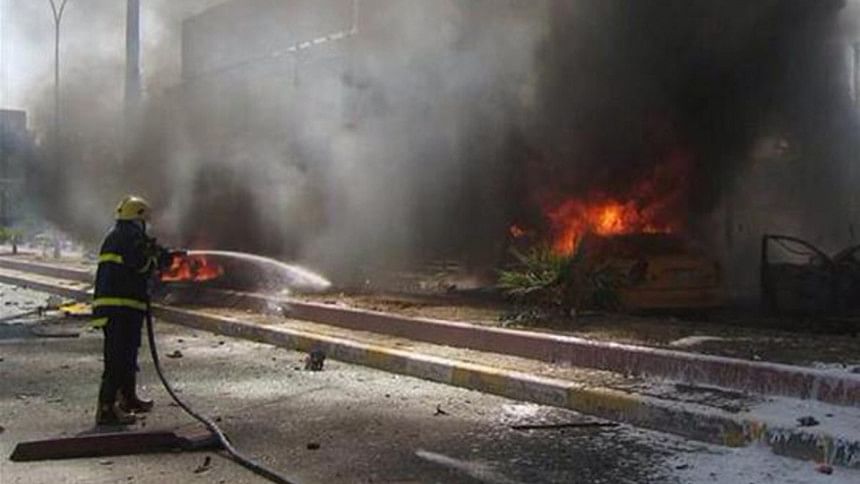126 killed in Yemen mosque bombings

- 260 also wounded in the blasts
- Worshippers targeted at Friday prayers
- Air strikes target Hadi palace in Aden
- Violence spreading, causing unease in Gulf, West
Suicide bombers in the Yemeni capital Sanaa blew themselves up during Friday prayers at two mosques used by supporters of Shi'ite rebels, killing 126 people and wounding 260 in the country's deadliest militant attack in years, medical sources said.
Update: At least 120 killed, 300+ injured in Yemen mosque bombings, officials say. http://t.co/OKI2rnFXE6 pic.twitter.com/SG7nqgFGVS
— CNN Breaking News (@cnnbrk) March 20, 2015
Islamic State, an al Qaeda offshoot that has seized large areas of Iraq and Syria, claimed responsibility for the attacks, in which four bombers wearing explosive belts targeted worshippers in and outside the crowded mosques.
The Sanaa bombings happened as unidentified warplanes attacked the presidential palace in the southern city of Aden for the second day.
Anti-aircraft guns fired on two planes which dropped bombs on an area that includes the residence of President Abd-Rabbu Mansour Hadi. He was unharmed, sources at the presidency said.
Yemen is torn by a power struggle between the Iranian-backed Houthi rebels in the north and Hadi, who has set up a rival power base in the south backed by Sunni-led Gulf Arab states.
The mosques in Sanaa are known to be used mainly by supporters of the Shi'ite Muslim Houthi group, which controls most of northern Yemen, including Sanaa.
The rise to power of the Houthis since September last year has deepened divisions in Yemen's complex web of political and religious allegiances.
One witness said he heard two successive blasts at one of the mosques, known as the Badr mosque, in a busy neighbourhood in central Sanaa.
"I was going to pray at the mosque then I heard the first explosion, and a second later I heard another one," the witness told Reuters.
APPEAL FOR BLOOD
Hospitals in Sanaa appealed for blood donors to help treat the large number of casualties. A Reuters witness at the Badr mosque said he counted at least 25 bloody bodies or corpses lying in the street and inside the building.
One man carried a child in his arms.
The Houthi-linked Al-Masirah television channel showed young men in traditional Yemeni clothes carrying lifeless bodies, some dripping with blood, out of the mosque.
A third suicide bomber tried to blow himself up a mosque in the northern Houthi stronghold of Sadaa province. But the bomb went off prematurely, killing only the bomber, a security source told Reuters.
Islamic State claimed responsibility for that attack too, vowing to carry out more assaults on the Houthis.
"God willing, this operation is only a part of a coming flood," the group said in a statement posted by supporters on Twitter.
Tensions have risen since Hadi fled to Aden in February after escaping from Sanaa, where he was held for a month under house arrest by Houthi forces in control of the capital.
Hadi has been trying to consolidate his hold over Aden to challenge the Houthis' ambitions to control the whole country.
Thirteen people were killed on Thursday when forces loyal to Hadi fought their way into Aden's international airport and wrested an adjacent military base from a renegade officer, Aden governor Abdulaziz bin Habtoor said.
Both the fighting on the ground and subsequent air attacks appeared to be part of a growing power struggle between Hadi and the Houthi group, which is allied with former president Ali Abdullah Saleh, a fierce critic of Hadi.

 For all latest news, follow The Daily Star's Google News channel.
For all latest news, follow The Daily Star's Google News channel. 



Comments